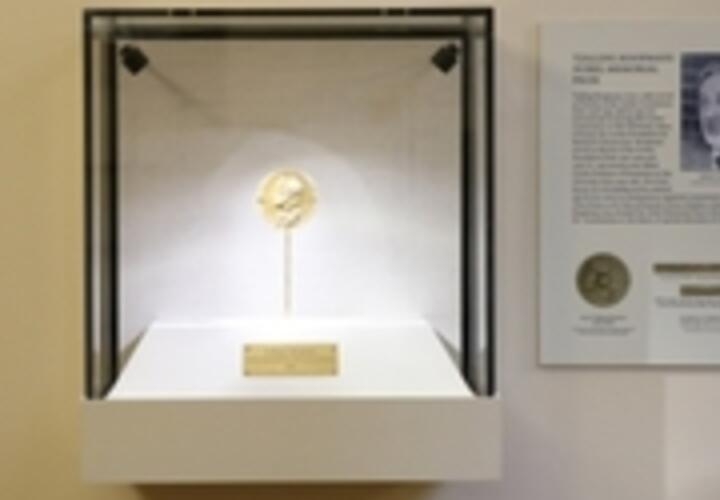A Place of Its Own: Tjalling Koopmans’ Nobel Prize Medal Now on Display
The Cowles Foundation has put Tjalling Koopmans’ Nobel Prize Medal on permanent display at 30 Hillhouse. A secure showcase alongside a plaque are mounted on a wall in the front lobby prominently displaying the prize.

The Cowles Foundation has put Tjalling Koopmans’ Nobel Prize Medal on permanent display at 30 Hillhouse. A secure showcase alongside a plaque are mounted on a wall in the front lobby prominently displaying the prize. The medal was gifted to Cowles by the Frankel family during an intimate ceremony held at 28 Hillhouse Avenue on May 24, 2019. The donation of Koopmans’ Nobel Medal is especially meaningful, as he was a life-long staff member of Cowles Foundation who served two terms as director in the 1960s, and more importantly, was instrumental in moving the Foundation (then the Cowles Commission) from the University of Chicago to Yale in 1955. With the help of the Yale Peabody Museum Graphic Designer Sally Pallatto and Museum Technician Maishe Dickman, the pair created a wall plaque, crafted a mount for the medal, and put the finishing touches on the display last month. During the gifting ceremony, Anne Frankel (Koopmans’ daughter) spoke of her father, his work, and details of the Nobel Prize Medal before handing it over to former Cowles Director, Al Klevorick, who accepted the gift on behalf of the Cowles Foundation. “In my view, Tjalling Koopmans embodied, in person and in his work, the Cowles Foundation,” said Klevorick. “It is a great honor for us to have the medal and be able to display it.” To mark the occasion, Yale Economics Professors and fellow Nobel laureates William Nordhaus and Robert Shiller were on hand to speak of Koopmans’ influence on their careers. In my view, Tjalling Koopmans embodied, in person and in his work, the Cowles Foundation. It is a great honor for us to have the medal and be able to display it. -Al Klevorick, Cowles Director 1984-96 Professor Robert Shiller spoke of Koopmans’ influence in the use of theory in the field of economics. Shiller went on to explain how the Cowles Foundation seal and its motto changed when the foundation moved to Yale, and how the new motto was influenced by Koopmans after the Foundation’s move. “The motto is, ‘Theory and Measurement,’ which is exactly a transposition of [Koopmans’] 1947 paper,” noted Shiller. “I think the spirit of [Koopmans’] research lives on at Cowles,” said Shiller. ”Tjalling was very import in forming the ethos and method that lives on today in the Cowles Foundation, and more broadly, the Yale community.” Professor William Nordhaus spoke of meeting Tjalling Koopmans for the first time during a job interview, and how he was impressed with Koopmans’ wide range of interests. He said it was Koopmans’ influence of mathematical programming that put him on the environmental-economics track. Koopmans suggested that Nordhaus use programming models to better understand the way systems work rather than econometrics for e-structural analysis to ultimately see the impacts of economics on climate change. In his remarks, Nordhaus quoted the speech given by Koopmans during the 1975 Economics Nobel banquet. In the speech, Koopmans referenced one of Nordhaus’ early studies on environmental issues which was an honor to Nordhaus, but more to the point, it showed Koopmans’ foresight. One line from the speech read, ”[Nordhaus’] study is an open invitation to climatologists and agronomists to trace the probable effects of the CO2 standard on climate variables and hence on polar icecaps, on ocean levels and on agricultural yields – thus enabling economists to seek a balance between energy production, food production, and anticipated other global effects and interregional inequities to be compensated for.” Nordhaus went on to say, “I thought that was really extraordinary; so far ahead of his time.” “That was what was so special about working with Tjalling,” said Nordhaus. “He had fundamental and deep insights into so many areas. It lives with me and my spirit in a way I think about economics, and a way I think about society and social issues.” Anne Frankel was joined by her husband Joseph Frankel, her son Martin Ünsal-Frankel, and Martin’s wife, Gün Ünsal-Frankel. Joseph Frankel reminisced of Koopmans from a “different perspective” with an anecdote as a “young suitor” when courting Anne. Joseph Frankel said he was given a problem by Koopmans to solve to see if he was capable of a shift in perspective. “Fortunately, I passed that one,” quipped Frankel. Tjalling Koopmans (jointly with Leonid Kantorovich) was awarded the Nobel Memorial Prize in Economic Sciences in 1975 for his contributions to the field of resource allocation, specifically the theory of optimal use of resources. ”I think [the medal] is and will be an inspiration for faculty and students who come here to see it,” said Nordhaus.